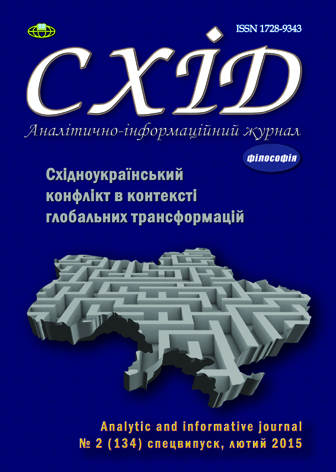Fragmentary mentality of Donbas: towers of besieged town
DOI:
https://doi.org/10.21847/1728-9343.2015.2(134).40316Keywords:
mentality, fragmentarity, myth and fairytale archetypes.Abstract
The Russian-Soviet fundamentals of mentality of present-day Donbas inhabitants are reviewed, which the author describes as affective fragmentary mentality. Its key features are historical versatility of values, sharp internal contradiction, entwinement of archaic heathen and Christian ideas, strong influence of myth and fairytale archetypes as well as incapability to accept positive ideas of western civilization at large. A number of attempts to modernize the country and accept the educational heritage of Europe have not changed Russian-Soviet mentality, the latter taking a disguising and imitational, externally aggressive and internally confined form. Further still, Russian-Soviet mentality preserved its local microcosm - the archaic peasant world. It produced justification to its slavish and serf state as well as tellurgic principles of justice and developed crafty mechanisms for preservation of its identity. That said, mentality of the ruling class also remained unchanged - having escaped European education, it remained to be haughty parasiting community which complied with bureaucratic and clientelist values. Such stagnation trends existed in the USSR and in the Donbas territory during the years of independence of Ukraine. The post-Soviet people of the Donbas could not create social space for self-development, the majority lacking adaptation mechanisms for the purpose and motivations for acquiring modern skills. Mental stagnation resulted in refusal to perceive the present day and its reality. Donbas mentality has therefore developed no positive mechanisms for adaptation to new reality of life and refused modern meanings of life, by sinking into archaic archetypes of the Russian-Soviet past.
Downloads
References
Pasko І. (2013), History. Nation. Personality. Favorites: historical and philosophical studies and manuscripts, LLC "East Publishing House" Association philosophers and religious studies, Donetsk branch of the Center of Humanitarian Education Sciences of Ukraine, Donetsk, 424 p. (ukr).
Riabchuk N. (2000), Dilemmas Ukrainian Faust: Civil Society and "nation-building", Kyiv, 272 p. (ukr).
Kozlovets M. (2009), Рhenomenon of national identity: the challenges of globalization, Monograph, Zhytomyr, 558 p. (ukr).
Marx K. Exposing the diplomatic history of the XVIII century, available at: http://psk.at.ua> Books / razoblachenija.doc (rus).
Berdiaiev N. A. (1990), Origin of Russian Communism, Nauka, Moscow, 224 p. (rus).
Turenko О. (2006), Fear: an attempt to philosophical understanding of the phenomenon, PARAPAN, Kyiv, 216 p. (ukr).
Rybakov B. I. (1986), Paganism Ancient Rus, Nauka, Moscow, 784 р. (rus).
Ortega-i-Gasset Hose (1994), Selected Works, Fundamentals, Kyiv, 420 p. (ukr).
Pipes R. (2008), Russian conservatism and its critics: a study of political culture, New Publishing, Moscow, 252 p. (rus).
Adelman N. Y. (1989), "Revolution from above" in Russia, Moscow, 176 p. (rus).
Troubetchkoy Ye. N. Аnother kingdom and its seekers in the Russian folk tale, available at: http://philologos.narod.ru/sophia/trub.htm (rus).
Levada Y. A. (2000), Homo Post-Soveticus, Social studies and the present, № 6, pp. 5-24 (rus).
Levada Y. (2002), "Man nostalgic": Realities and Challenges, Public Opinion Monitoring: Economic and social changes, № 6, pp. 7-13 (rus).
Downloads
Published
How to Cite
Issue
Section
License
Copyright (c) 2015 Oleh Turenko

This work is licensed under a Creative Commons Attribution-NonCommercial-NoDerivatives 4.0 International License.
1. Authors bear responsibility for the accuracy of facts, quotations, numbers and names used.
2. Manuscripts are not sent back.
3. The publisher does not always agree with the authors' opinion.
4. The authors reserve the right to authorship of the work and pass the first publication right of this work to the journal under the terms of a Creative Commons Attribution-NonCommercial-NoDerivatives 4.0 International License. This license allows others to distribute (copy) the published work for non-commercial purposes, provided there is mandatory attribution to its authors and a link to the first publication in our journal.
5. The authors have the right to conclude separate supplement agreements that relate to non-exclusive work distribution in the form in which it has been published by the journal (for example, to upload the work to the online storage of the journal or publish it as part of a monograph), provided that the reference to the first publication of the work in this journal is included.

